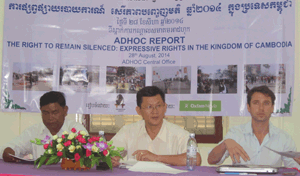Why did Khmer kill Khmer?
The ECCC is a hybrid tribunal created as the result of an agreement between the United Nations and the Government of Cambodia. It has the jurisdiction to try the top Khmer Rouge leaders who committed serious crimes between 1975 and 1979. One of the major innovations of the Extraordinary Chambers in the Courts of Cambodia (ECCC) is the enhanced recognition of victims in its proceedings. As a component of the Cambodian civil law, victims have the same procedural rights as the other parties. Therefore, victims of the former Khmer Rouge Regime have the opportunity to file complaints or participate as Civil Parties (CPs) in the trial. In this capacity, they are recognized as parties to the proceedings and are allowed to claim “moral and collective” reparations.
From the beginning, ADHOC has been highly committed to supporting the ECCC, not only in its outreach activities, but also in supporting victims who wish to participate in the proceedings. Through ADHOC’s support scheme, the victims get assistance in completing the victim’s information forms and can decide if they wish to submit a complaint or a civil party application. Moreover, ADHOC supports the CPs in finding a legal representation and also updates and empowers the civil parties through regular meetings with their civil party lawyers.
Since 2008, ADHOC has arranged monthly meetings for the civil parties and their lawyers. The meetings serve to inform the CPs about their rights, explain the technicalities of the legal proceedings, and provide updates about the recent development in the trial. The CPs are encouraged to ask questions and express their opinions and expectations. Furthermore, these meetings prepare the CPs both intellectually and emotionally, for what to expect when they attend the Court. For most of the civil parties, the experience of attending the trial may open old wounds, as the CPS see the Accused face to face and hear all the cruel details of what happened to their loved ones.
The Civil Parties still want to know how all this could happen. Why were Khmer killing Khmer?: “I am very upset about why Khmer killed Khmer? What was the purpose? For whom were they doing this?” They want to get answers to those questions from the accused persons. In Case 001, Duch is standing trial and answering questions about the atrocities.
Instead of giving the answers, he tried to apologize to the victims in court and was greeting them ceremonially for several days. The attendant CPs were offended by this behavior, and the civil parties’ lawyers formally requested him to stop.
Nevertheless, most of the civil parties are not scared of him anymore: “I do not fear [Duch] anymore, because he is now a tiger without any teeth.”
So far, Duch hasn’t answered any of the specific questions asking why and how all this could happen. He has only said that he was “very regretful and very shameful” for the crimes he committed in the name of Angkor. He affirmed that he had decided to cooperate with the tribunal because this was the only remedy that he had “to relieve the sorrow of the Cambodian people”.
The truth may be revealed and a fair judgment reached, but it is the participation of the civil parties that gives the victims of the Khmer Rouge Regime an opportunity to come to terms with the past.

